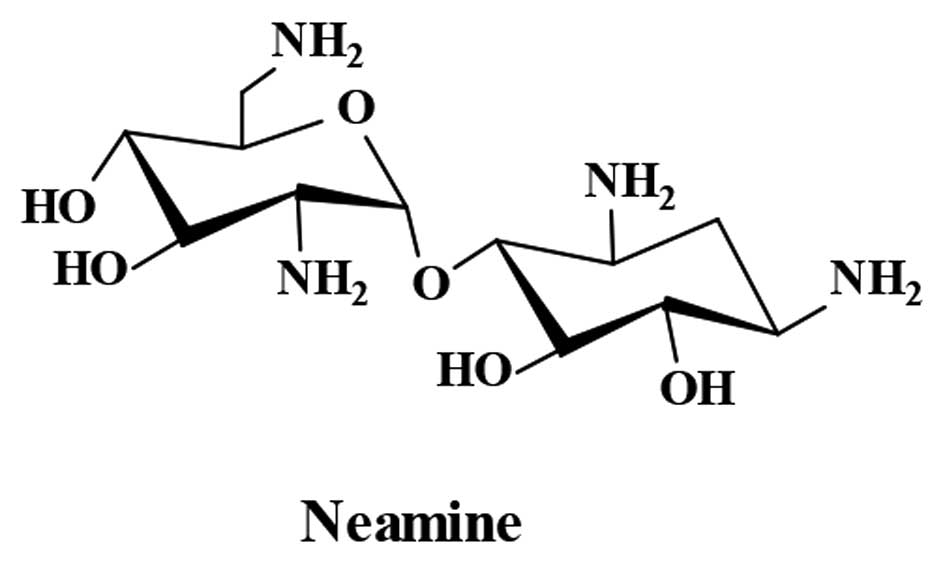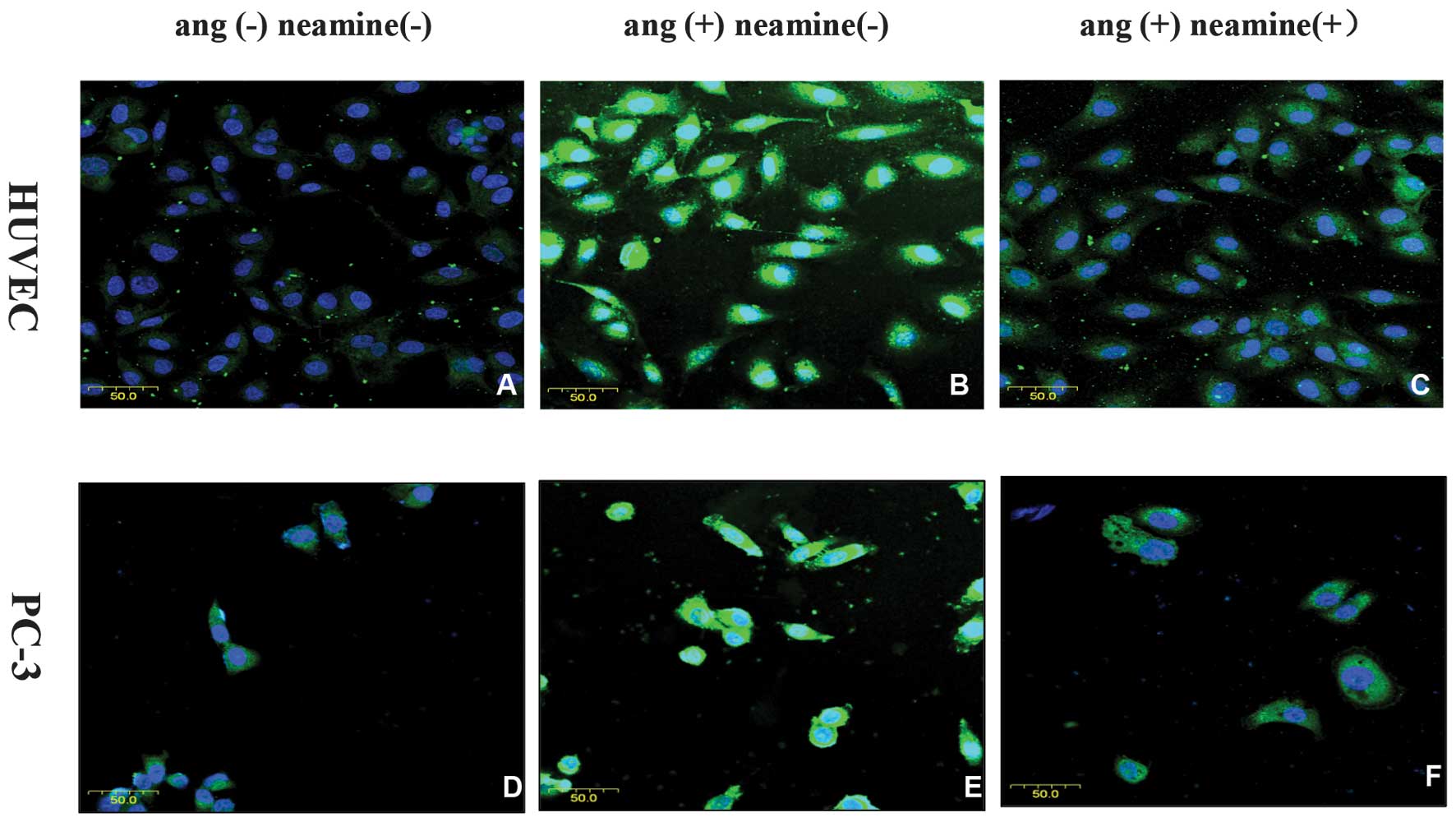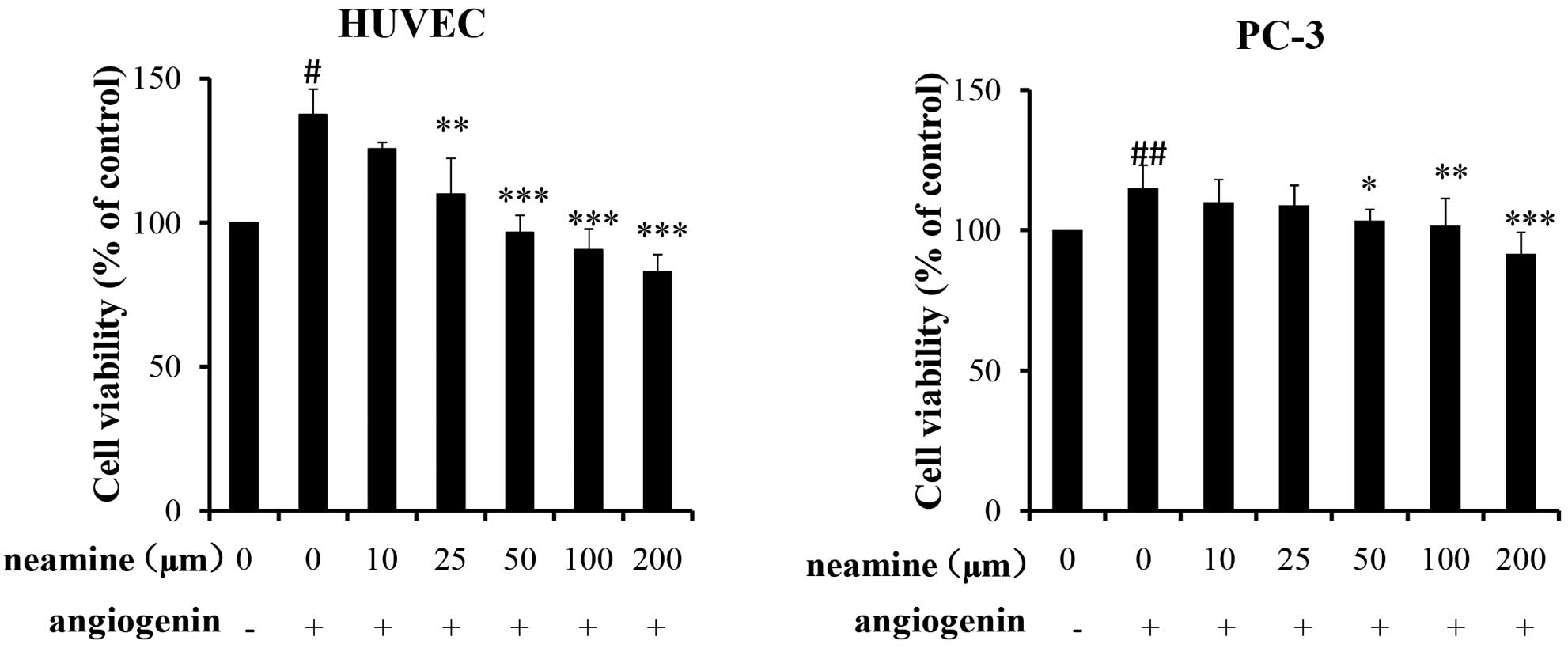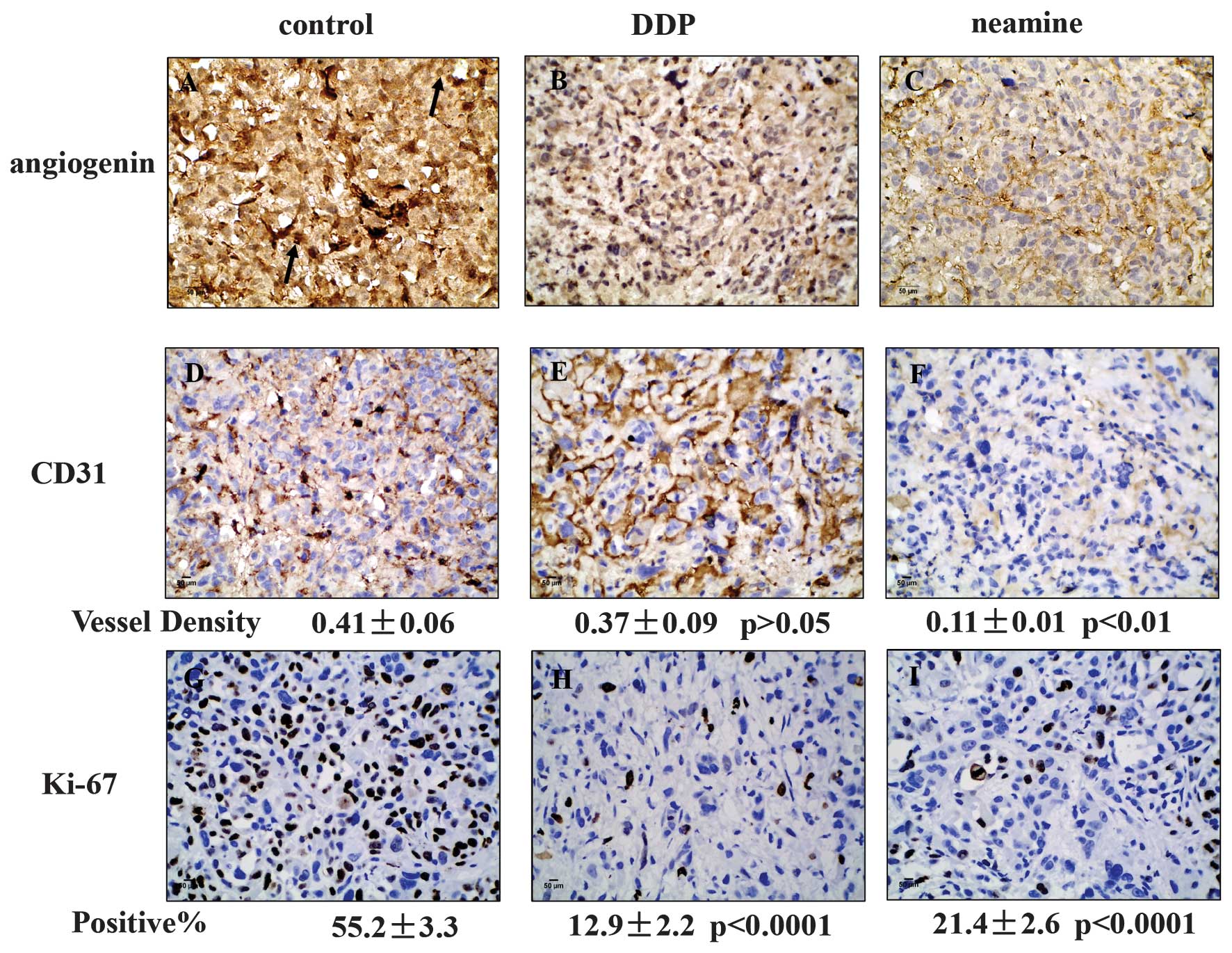|
1
|
Greenlee RT, Hill-Harmon MB, Murray T and
Thun M: Cancer statistics, 2001. CA Cancer J Clin. 51:15–36. 2001.
View Article : Google Scholar : PubMed/NCBI
|
|
2
|
Siegel R, Ma J, Zou Z and Jemal A: Cancer
statistics, 2014. CA Cancer J Clin. 64:9–29. 2014. View Article : Google Scholar : PubMed/NCBI
|
|
3
|
Santos AF, Huang H and Tindall DJ: The
androgen receptor: A potential target for therapy of prostate
cancer. Steroids. 69:79–85. 2004. View Article : Google Scholar : PubMed/NCBI
|
|
4
|
Izawa JI and Dinney CP: The role of
angiogenesis in prostate and other urologic cancers: A review.
CMAJ. 164:662–670. 2001.PubMed/NCBI
|
|
5
|
Ferrer FA, Miller LJ, Andrawis RI,
Kurtzman SH, Albertsen PC, Laudone VP and Kreutzer DL: Vascular
endothelial growth factor (VEGF) expression in human prostate
cancer: In situ and in vitro expression of VEGF by human prostate
cancer cells. J Urol. 157:2329–2333. 1997. View Article : Google Scholar : PubMed/NCBI
|
|
6
|
Wikström P, Bergh A and Damber JE:
Transforming growth factor-beta1 and prostate cancer. Scand J Urol
Nephrol. 34:85–94. 2000. View Article : Google Scholar : PubMed/NCBI
|
|
7
|
Acevedo VD, Gangula RD, Freeman KW, et al:
Inducible FGFR-1 activation leads to irreversible prostate
adenocarcinoma and an epithelial-to-mesenchymal transition. Cancer
Cell. 12:559–571. 2007. View Article : Google Scholar : PubMed/NCBI
|
|
8
|
Uotila P, Valve E, Martikainen P,
Nevalainen M, Nurmi M and Härkönen P: Increased expression of
cyclooxygenase-2 and nitric oxide synthase-2 in human prostate
cancer. Urol Res. 29:23–28. 2001. View Article : Google Scholar : PubMed/NCBI
|
|
9
|
Fett JW, Strydom DJ, Lobb RR, et al:
Isolation and characterization of angiogenin, an angiogenic protein
from human carcinoma cells. Biochemistry. 24:5480–5486. 1985.
View Article : Google Scholar : PubMed/NCBI
|
|
10
|
Moroianu J and Riordan JF: Nuclear
translocation of angiogenin in proliferating endothelial cells is
essential to its angiogenic activity. Proc Natl Acad Sci USA.
91:1677–1681. 1994. View Article : Google Scholar : PubMed/NCBI
|
|
11
|
Kishimoto K, Liu S, Tsuji T, Olson KA and
Hu GF: Endogenous angiogenin in endothelial cells is a general
requirement for cell proliferation and angiogenesis. Oncogene.
24:445–456. 2005. View Article : Google Scholar : PubMed/NCBI
|
|
12
|
Bottero V, Sadagopan S, Johnson KE, Dutta
S, Veettil MV and Chandran B: Kaposi's sarcoma-associated
herpesvirus-positive primary effusion lymphoma tumor formation in
NOD/SCID mice is inhibited by neomycin and neamine blocking
angiogenin's nuclear translocation. J Virol. 87:11806–11820. 2013.
View Article : Google Scholar : PubMed/NCBI
|
|
13
|
Majumder PK, Yeh JJ, George DJ, et al:
Prostate intraepithelial neoplasia induced by prostate restricted
Akt activation: The MPAKT model. Proc Natl Acad Sci USA.
100:7841–7846. 2003. View Article : Google Scholar : PubMed/NCBI
|
|
14
|
Pina F, Botelho F, Lopes T, et al: Can
serum angiogenin be used to improve the diagnostic performance in
prostate cancer screening. Eur J Cancer Prev. 23:166–172. 2014.
View Article : Google Scholar : PubMed/NCBI
|
|
15
|
Katona TM, Neubauer BL, Iversen PW, Zhang
S, Baldridge LA and Cheng L: Elevated expression of angiogenin in
prostate cancer and its precursors. Clin Cancer Res. 11:8358–8363.
2005. View Article : Google Scholar : PubMed/NCBI
|
|
16
|
Yoshioka N, Wang L, Kishimoto K, Tsuji T
and Hu GF: A therapeutic target for prostate cancer based on
angiogenin-stimulated angiogenesis and cancer cell proliferation.
Proc Natl Acad Sci USA. 103:14519–14524. 2006. View Article : Google Scholar : PubMed/NCBI
|
|
17
|
Olson KA, Fett JW, French TC, Key ME and
Vallee BL: Angiogenin antagonists prevent tumor growth in vivo.
Proc Natl Acad Sci USA. 92:442–446. 1995. View Article : Google Scholar : PubMed/NCBI
|
|
18
|
Olson KA, French TC, Vallee BL and Fett
JW: A monoclonal antibody to human angiogenin suppresses tumor
growth in athymic mice. Cancer Res. 54:4576–4579. 1994.PubMed/NCBI
|
|
19
|
Hu GF: Neomycin inhibits
angiogenin-induced angiogenesis. Proc Natl Acad Sci USA.
95:9791–9795. 1998. View Article : Google Scholar : PubMed/NCBI
|
|
20
|
Zhao J, Wang YC, Yang LY, Yu DH, Pan PT
and Wang L: Neamine inhibits cell proliferation, migration, and
invasion in H7402 human hepatoma cells. Saudi Med J. 31:1309–1314.
2010.PubMed/NCBI
|
|
21
|
Kishimoto K, Yoshida S, Ibaragi S,
Yoshioka N, Hu GF and Sasaki A: Neamine inhibits oral cancer
progression by suppressing angiogenin-mediated angiogenesis and
cancer cell proliferation. Anticancer Res. 34:2113–2121.
2014.PubMed/NCBI
|
|
22
|
Yuan Y, Wang F, Liu XH, Gong DJ, Cheng HZ
and Huang SD: Angiogenin is involved in lung adenocarcinoma cell
proliferation and angiogenesis. Lung Cancer. 66:28–36. 2009.
View Article : Google Scholar : PubMed/NCBI
|
|
23
|
Hirukawa S, Olson KA, Tsuji T and Hu GF:
Neamine inhibits xenografic human tumor growth and angiogenesis in
athymic mice. Clin Cancer Res. 11:8745–8752. 2005. View Article : Google Scholar : PubMed/NCBI
|
|
24
|
Majumdar MK and Majumdar SK: Isolation and
characterization of three phosphoamido-neomycins and their
conversion into neomycin by Streptomyces fradiae. Biochem J.
120:271–278. 1970.PubMed/NCBI
|
|
25
|
Deng SR, Li J, Zhang ZQ, et al: DS147
improves pregnancy in mice with embryo implantation dysfunction
induced by controlled ovarian stimulation. J Huazhong Univ Sci
Technolog Med Sci. 33:573–580. 2013. View Article : Google Scholar : PubMed/NCBI
|
|
26
|
Hirukawa S, Olson KA, Tsuji T and Hu GF:
Neamine inhibits xenografic human tumor growth and angiogenesis in
athymic mice. Clin Cancer Res. 11:8745–8752. 2005. View Article : Google Scholar : PubMed/NCBI
|
|
27
|
Williams PD, Bennett DB, Gleason CR and
Hottendorf GH: Correlation between renal membrane binding and
nephrotoxicity of aminoglycosides. Antimicrob Agents Chemother.
31:570–574. 1987. View Article : Google Scholar : PubMed/NCBI
|
|
28
|
Au S, Weiner N and Schacht J: Membrane
perturbation by aminoglycosides as a simple screen of their
toxicity. Antimicrob Agents Chemother. 30:395–397. 1986. View Article : Google Scholar : PubMed/NCBI
|
|
29
|
Yang B and Wang JJ: Industry News: Avastin
approved for metastatic colorectal cancer. Discov Med. 4:79–80.
2004.PubMed/NCBI
|



















